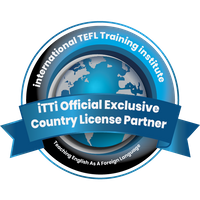"Without challenges, we won't feel the taste of success and happiness we wish for our people in this dear land."
TAKE A TESOL/TEFL COURSE IN THE UAE
The Emirate of Sharjah had a population of 800,000 people in 2008 according to their last consensus and covers an area in the north of 2600 square km. It is one of the only emirates that have a constitutional monarchy of the Al Qasimi dynasty.
The city of Sharjah is a beautiful, modern city which is continually developing in terms of tourism. In this emirate, you can find beautiful beaches lined with palm trees and white, soft sand, including wonderful architecture that boasts the superior court of Sharjah and its own universities.
The UAE is fast becoming a popular teaching destination for EFL teachers. With great pay packages, inviting weather, and its diverse multicultural society, the UAE becomes an attractive home to many wishing to teach English abroad.
TESOL course in Dubai
Our iTTi UAE TEFL Institute in Sharjah
Recently, the training center has started training EFL teachers through a 120-Hour Combined TEFL/TESOL Certification program. Graduates from the program will fill the urgent need for qualified English teachers in the Middle East.
The mission of CEC is to meet the lifelong educational and training needs of all learners in the local community and the UAE region. CEC offers a variety of standard certificate programs, non-credit courses, and workshops in the UAE. CEC aims to enhance professional and technical skills while addressing the needs for personal development and cultural enrichment.
TESOL course in Dubai
WORK IN SARJAH OR IN THE UAE AS A TEFL/TESOL TEACHER
Prerequisites for Teaching in the UAE
Foreign teachers need to have a work permit. To apply for that in your home country, you must have a BA/BS in a related field and an iTTi TEFL Certificate with Teaching Practicum. As schools like to see teaching experience, don’t go for the least expensive online course. This will not work in the UAE. Your prospective school must support you with the visa application paperwork just like it is in other countries.
If you are a non-native speaker, your level of English must be perfect in order to be competitive. What is perfect? Level C1 or C2—not only in speaking but also in writing. If you are unsure, ask for our free proficiency test and learn how you can improve your performance if required.
Teaching Opportunities
There are positions in public schools, language centers, vocational schools, universities, and international schools.
Contract Length
Most of the schools prefer or require a 2-3-year contract.
Salary & Benefits
Salaries for teaching in Dubai and the UAE often range from $3,300 – $5,500 USD per month tax free, considerably more for administrators. Compensation packages usually include housing or a housing allowance along with relocation money and end of contract bonuses. They include accommodation, flights, health insurance, and education allowances for dependents. It is a great place to start with if you want to save some money and get some great travel experience. iTTi can help you connect to teaching jobs in Dubai, Abu Dhabi, Ajman, and other locations.
Healthcare System in the UAE
The UAE has a state-of-the-art healthcare system that is available to both locals and foreign workers via hospitals, clinics, and health care centers. Medical care can compete with that of any country in the world. As an English teacher in the UAE, you will have access to public health care as well as private healthcare facilities (often English speaking). Having proper health insurance is essential as prices at private hospitals in the UAE can get very high.
If you teach in Abu Dhabi, your school will generally provide health insurance coverage for you and your dependents (your spouse and up to three children). Your employer in Dubai will also provide you with health insurance, but you will most likely be responsible for getting health insurance for your dependents. That said, this is at the employer’s discretion as well as your agreement with the school. Check the terms of your contract.
Pharmacies
There are lots of pharmacies in the UAE, many of which work round the clock. Pharmacies that are not 24-hour, generally work from Saturday to Thursday, from 9 am to 9 pm.
You should have no trouble finding the most popular medications in the UAE; however, some prescription drugs that are widely used in other countries may be illegal in the UAE. Check on prohibited medications with the UAE consulate in your country before departure.
Important Emergency Numbers
UAE’s primary emergency number is 999. It will connect you to the police and should be enough in most emergency situations.
Other important numbers include:
All of the above numbers are toll-free.
When you call the emergency hotline in the UAE, be prepared that you will be answered in Arabic. English and other-language-speaking operators are available upon request. With that, having an Arabic speaker by your side when you call the hotline can be very helpful.
Culture in the UAE
The UAE is predominantly Sunni Muslims, and its culture is rooted in Arabic Islamic traditions. The country is a melting pot of different cultures brought in by foreign workers from all over the world, which is why it also has strong international influences while the traditional Islamic is still interwoven. There is a mix of old and new, which makes for a very refreshing and worldly perspective on tolerance and hospitality.
Languages Spoken
Arabic is the most dominant language spoken in the UAE, but English, Malayalam, Hindi, Tamil, Tulu, Amharic, Somali, Bengali and Tigrinya are also widely spoken by foreign workers.
Religion
Islam is both the official and majority religion in the United Arab Emirates, practiced by approximately 78% of the population. The Al Nahyan and Al Maktoum ruling families adhere to Sunni Islam of Maliki school of jurisprudence. Many followers of the Hanbali school of Sunni Islam are found in Sharjah, Umm al-Quwain, Ras al-Khaimah and Ajman. Their followers include the Al Qasimi ruling family. Other religions represented in the country including Christianity, Hinduism, Buddhism, Judaism, and Sikhism are practiced by non-nationals.
Food & Drinks
Like everywhere, Emirati food reflected the region’s culture, climate, and resources. It has undergone many changes. After discovering oil and the influx of foreigners, their cuisine underwent many changes. For instance, chicken meat is a relatively new addition to the food tradition in Dubai. Before that, they used camels, goats, and other birds like Houbaras for meat. Because of the prevalent fishing trade among Emiratis, fish was a significant part of the dishes.
Consumption of alcohol is no longer a criminal offense, and a license fee is no longer required for residents or tourists. A person still must be at least 21 years old to buy alcohol legally in the UAE, and anyone caught selling alcohol to someone deemed underage will be punished. Alcohol can only be consumed privately or in licensed public places.
TEFL courses in the UAE fill up quickly!
120-HOUR COMBINED TESOL TRAINING
120-HOUR ON-SITE TESOL TRAINING
100% ON-SITE TRAINING
Total tuition: US $1,500
Deposit: $500, due at registration.
Balance payment: $1,000 due five business days before the first course date. The entire four-week TEFL course takes place in one of the many TEFL training centers. Students learn everything with a trainer face to face. The program comes with daily practical teaching of non-speakers of English over three weeks. The TEFL trainer observes the classes and coaches the prospective teacher to higher levels of performance.120-HOUR COMBINED TESOL TRAINING
75% on-line/25% on-site training
Total tuition: US $1,200 Deposit: $500, due at registration. Balance payment: $700 due five business days before start of the Teaching Practicum. This TEFL program has the same content as the on-site program. The theory of teaching English is studied on-line with a tutor. Upon completion of the online part, students go to the TEFL training center for seven days and practice teaching English under the supervision of an experienced TEFL trainer.Teaching Praticum Dates
|
Course Dates
|
Session
|
Timing
|
Session
|
Timing
|
|---|---|---|---|---|
|
5 June - 3 July 2024
|
Night Session
|
6:00 – 9:00
|
Morning Session
|
10:00 – 1:00
|
|
3 July - 7 August 2024
|
Night Session
|
6:00 – 9:00
|
Morning Session
|
10:00 – 1:00
|
|
7 August - 11 September 2024
|
Night Session
|
6:00 – 9:00
|
Morning Session
|
10:00 – 1:00
|
|
11 September - 16 October 2024
|
Night Session
|
6:00 – 9:00
|
Morning Session
|
10:00 – 1:00
|
|
16 October - 20 November 2024
|
Night Session
|
6:00 – 9:00
|
Morning Session
|
10:00 – 1:00
|
|
20 November - 25 December 2024
|
Night Session
|
6:00 – 9:00
|
Morning Session
|
10:00 – 1:00
|
Meet our iTTi TEFL Sharjah Team

In 2010, He moved overseas and joined – Score Testing Center in Sharjah, United Arab Emirates as Computer Tech-support. For his excellent handling of various projects, he was promoted to operations manager in 2010, where he was responsible for overseeing the various projects within the company’s scope and providing analyzed business strategies within the organization. He also helped to negotiate new contracts, taking into account company performance as well as the capabilities of employees and resources. Through his different experiences successfully driving value and growth at companies, Randy is able to apply his experiences to handle the different scenarios facing the companies.
Randy Santiago
iTTi - United Arab Emirates
TESOL course in Dubai
How to Apply for a TESOL Course
Step 1
To begin the admission process for iTTi UAE, you must first choose your starting date, complete the online application form, and pay the deposit of USD $500.
Step 2
An iTTi Enrollment Counselor will then contact you with instructions on how to complete the required English proficiency assessment test. If you are not a native speaker, you must obtain a B2/C1 level. A certificate will be provided by iTTi School of English.
Step 3
Once you are notified of your acceptance into iTTi in UAE, your remaining tuition balance is due 30 days prior to your course starting date.



